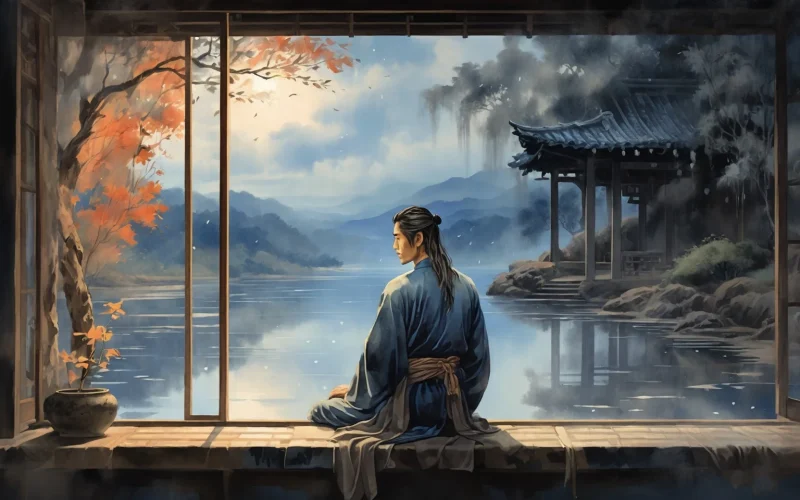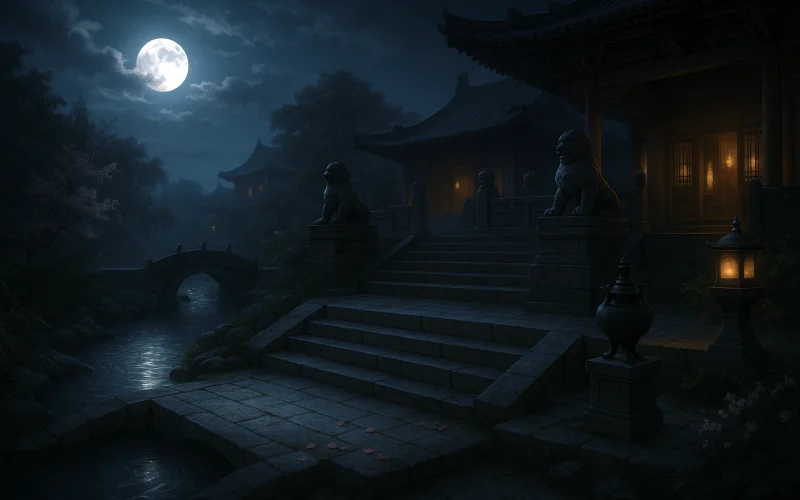The West Lake is fair in sunset’s afterglow;
The flowery shore with floating duckweed’s dotted.
For miles around the water’s smooth and flat.
No soul’s in sight but an unmanned boat’s left afloat.
The moon rises in southwest when clouds fade;
The breeze begins to waft through railings sweet.
The lotus blooms exhale faint fragrance around.
The lake wind blows the wine heat off my face and brow.
Original Poem
「采桑子 · 残霞夕照西湖好」
欧阳修
残霞夕照西湖好,花坞苹汀,
十顷波平,野岸无人舟自横。
西南月上浮云散,轩槛凉生。
莲芰香清,水面风来酒面醒。
Interpretation
Written in 1072 when the 70-year-old Ouyang Xiu, now retired in Yingzhou as the self-styled "Six-One Recluse," revisits the beloved West Lake where he once served as prefect. The unchanged landscape contrasts sharply with his transformed life, as twilight becomes a canvas for his mingled nostalgia and hard-won serenity.
First Stanza: "残霞夕照西湖好,花坞苹汀,十顷波平,野岸无人舟自横。"
Cán xiá xī zhào xī hú hǎo, huā wù píng tīng, shí qǐng bō píng, yě àn wú rén zhōu zì héng.
Dusk's afterglow bathes West Lake in grace—
Flower islets,
Duckweed shoals,
Ten leagues of unrippled space.
At wild shores, unmanned
Boats lie aslant in timeless embrace.
The stanza constructs a postcard of senescence and continuity: the "afterglow" (残霞) mirrors the poet's twilight years, while the numerical precision of "ten leagues" (十顷) measures nature's indifference to human absence. The "unmanned boats" (无人舟) become Yangtze School ink-wash brushstrokes—their diagonal posture (自横) echoing the recluse's oblique relationship with the world.
Second Stanza: "西南月上浮云散,轩槛凉生。莲芰香清,水面风来酒面醒。"
Xī nán yuè shàng fú yún sàn, xuān jiàn liáng shēng. Lián jì xiāng qīng, shuǐ miàn fēng lái jiǔ miàn xǐng.
Southwest moonrise dissolves drifting clouds—
Through railings,
Coolness seeps.
Lotus and water-chestnut scent
Ride the breeze,
Sobering wine-flushed cheeks
With lake-breath deep.
The ascendant moon (月上) performs celestial housekeeping, sweeping away clouds like cobwebs. The synesthetic sequence—thermal (凉生), olfactory (香清), and tactile (风来) stimuli—culminates in the metaphysical sobriety of "lake-breath" (水面风), where the body's intoxication yields to the mind's clarity. This ecological sobriety testifies to Ouyang's late-stage wisdom: nature's pharmacy curing worldly intoxications.
Holistic Appreciation
The poem is ingeniously structured, unfolding in distinct layers—moving from the distant to the near, from scenery to human emotion. The first stanza meticulously crafts a tranquil, ethereal lakeside dusk, emphasizing solitude and clarity; the second shifts from landscape to the poet’s inner world, revealing a state of mind both lonely and serene, melancholic yet transcendent. Though the poet never explicitly voices his emotions, his immersion in West Lake’s beauty, his sensitivity to the breeze, and his sober awakening under nightfall all subtly convey his detachment from political pursuits and his devotion to nature. The language is elegantly understated yet profoundly evocative, achieving remarkable artistic resonance.
Artistic Merits
This lyric poem masterfully embodies emotion within scenery, using the natural world to articulate introspection. Its structure is clear and progressive, transitioning seamlessly from the distant to the intimate, from outward observation to inward reflection. The diction is refined yet natural, restrained yet expressive—eschewing direct emotional outbursts while everywhere revealing the poet’s tranquil, lucid outlook after retreating from public life. Allusions and borrowed imagery meld effortlessly into the verse, blending scene and sentiment into a unified whole, showcasing Ouyang Xiu’s signature style: sparse yet profound, resonant with quiet depth.
Insights
This poem is not merely a celebration of West Lake’s beauty but also a meditation on the equanimity found after life’s turbulence. Through the quiet hues of twilight, the poet expresses the peace and awakening that follow the storms of officialdom. Even as past ambitions fade and worldly glories prove fleeting, he finds solace in nature’s subtleties, savoring its quiet joys—a testament to the Song Dynasty literati’s ideal of poised detachment and introspective depth.
It reminds us: Life, at times, is like “wine stirred by the wind”—clarity often arrives in stillness, and the truest emotions may dwell in the gentlest of landscapes.
About the Poet

Ouyang Xiu (欧阳修, 1007 - 1072), a native of Yongfeng, Jizhou (present-day Jiangxi Province), emerged as the preeminent literary figure of the Northern Song Dynasty. After attaining the jinshi degree in 1030, he spearheaded a literary reform movement that rejected the ornate Xikun style prevalent at court. As a mentor who nurtured literary giants like Su Shi and Zeng Gong, he laid the foundation for the golden age of Northern Song literature. Recognized as one of the "Eight Great Prose Masters of Tang and Song," Ouyang stands as the pivotal figure in the transformation of Northern Song literary culture.












